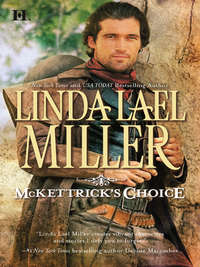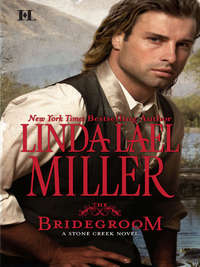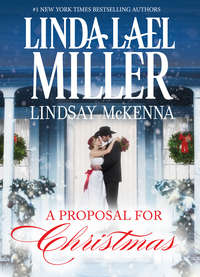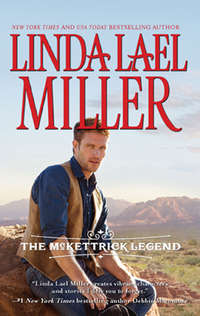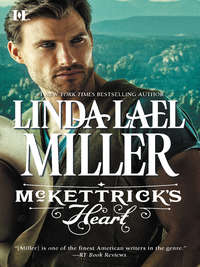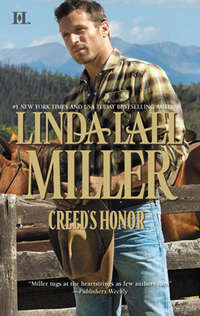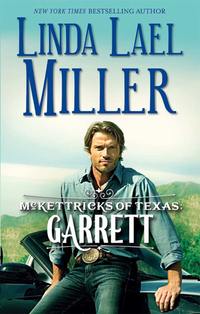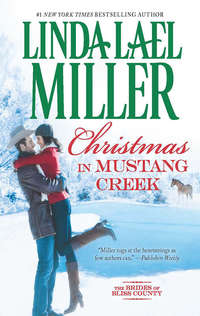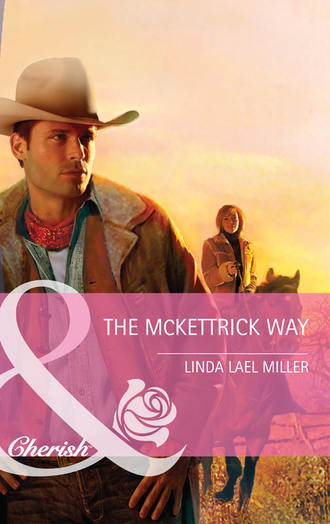
Полная версия
The Mckettrick Way

“Don’t believe everything you read about me,” Brad said easily.
“Who says I’ve been reading about you?”
“Come on, Meg. You expected me to drink Jack Daniel’s straight from the bottle. That’s hype – part of the bad-boy image. My manager cooked it up.”
“You haven’t been to rehab?”
He grinned. “Nope. Never trashed a hotel room, spent a weekend in jail or done any of the rest of the stuff you believe.”
“Really?”
“Really.” Brad pushed back his chair, returned to the jukebox and dropped a few coins in the slot. An old Johnny Cash ballad poured softly into the otherwise silent bar.
Brad started in her direction. He held out a hand to her.
Meg went to him. Automatically.
He drew her into his arms, holding her close but easy, and they danced without moving their feet. As the song ended, Brad propped his chin on top of Meg’s head and sighed. “I’ve missed you.”
LINDA LAEL MILLER
The daughter of a town marshal, Linda Lael Miller grew up in rural Washington. The self-confessed barn goddess was inspired to pursue a career as an author after a school teacher said the stories she was writing might be good enough to be published.
Linda broke into publishing in the early 1980s. She is now a New York Times bestselling author of more than sixty contemporary, romantic suspense and historical novels. When not writing, Linda enjoys riding her horses and playing with her cats and dogs. Through her Linda Lael Miller Scholarships for Women, she provides grants to women who seek to improve their lot in life through education.
For more information about Linda, her scholarships and her novels, visit www.lindalaelmiller.com.
Dear Reader,
A lot of you have asked for Meg McKettrick’s story, and here it is. What happens when a McKettrick butts heads with an O’Ballivan? Well, sparks fly, for one thing. Saddle up and ride with Meg, Brad and me, along with some familiar faces from earlier books, on an adventure of romance, humour and excitement in The McKettrick Way. I promise you’ll enjoy the journey, whether the McKettricks and O’Ballivans are old friends or new.
With love,
Linda Lael Miller
The McKettrick Way
LINDA LAEL MILLER

In memory of my dad, Grady “Skip” Lael.
Happy trails, Cowboy.
Chapter One
Brad O’Ballivan opened the driver’s-side door of the waiting pickup truck, tossed his guitar case inside and turned to wave a farewell to the pilot and crew of the private jet he hoped never to ride in again.
A chilly fall wind slashed across the broad, lonesome clearing, rippling the fading grass, and he raised the collar of his denim jacket against it. Pulled his hat down a little lower over his eyes.
He was home.
Something inside him resonated to the Arizona high country, and more particularly to Stone Creek Ranch, like one prong of a perfectly balanced tuning fork. The sensation was peculiar to the place—he’d never felt it in his sprawling lakeside mansion outside Nashville, on the periphery of a town called Hendersonville, or at the villa in Mexico, or any of the other fancy digs where he’d hung his hat over the years since he’d turned his back on the spread—and so much more—to sing for his supper.
His grin was slightly ironic as he stood by the truck and watched the jet soar back into the sky. His retirement from the country music scene, at the age of thirty-five and the height of his success, had caused quite a media stir. He’d sold the jet and the big houses and most of what was in them, and given away the rest, except for the guitar and the clothes he was wearing. And he knew he’d never regret it.
He was through with that life. And once an O’Ballivan was through with something, that was the end of it.
The jet left a trail across the sky, faded to a silver spark, and disappeared.
Brad was about to climb into the truck and head for the ranch house, start coming to terms with things there, when he spotted a familiar battered gray Suburban jostling and gear-grinding its way over the rough road that had never really evolved beyond its beginnings as an old-time cattle trail.
He took off his hat, even though the wind nipped at the edges of his ears, and waited, partly eager, partly resigned.
The old Chevy came to a chortling stop a few inches from the toes of his boots, throwing up a cloud of red-brown dust, and his sister Olivia shut the big engine down and jumped out to round the hood and stride right up to him.
“You’re back,” Olivia said, sounding nonplussed. The eldest of Brad’s three younger sisters, at twenty-nine, she’d never quite forgiven him for leaving home—much less getting famous. Practical to the bone, she was small, with short, glossy dark hair and eyes the color of a brand-new pair of jeans, and just as starchy. Olivia was low-woman-on-the-totem-pole at a thriving veterinary practice in the nearby town of Stone Creek, specializing in large animals, and Brad knew she spent most of her workdays in a barn someplace, or out on the range, with one arm shoved up where the sun didn’t shine, turning a crossways calf or colt.
“I’m delighted to see you, too, Doc,” Brad answered dryly.
With an exasperated little cry, Olivia sprang off the soles of her worn-out boots to throw her arms around his neck, knocking his hat clear off his head in the process. She hugged him tight, and when she drew back, there were tears on her dirt-smudged cheeks, and she sniffled self-consciously.
“If this is some kind of publicity stunt,” Livie said, once she’d rallied a little, “I’m never going to forgive you.” She bent to retrieve his hat, handed it over.
God, she was proud. She’d let him pay for her education, but returned every other check he or his accountant sent with the words NO THANKS scrawled across the front in thick black capitals.
Brad chuckled, threw the hat into the pickup, to rest on top of the guitar case. “It’s no stunt,” he replied. “I’m back for good. Ready to ‘take hold and count for something,’ as Big John used to say.”
The mention of their late grandfather caused a poignant and not entirely comfortable silence to fall between them. Brad had been on a concert tour when the old man died of a massive coronary six months before, and he’d barely made it back to Stone Creek in time for the funeral. Worse, he’d had to leave again right after the services, in order to make a sold-out show in Chicago. The large infusions of cash he’d pumped into the home place over the years did little to assuage his guilt.
How much money is enough? How famous do you have to be? Big John had asked, in his kindly but irascible way, not once but a hundred times. Come home, damn it. I need you. Your little sisters need you. And God knows, Stone Creek Ranch needs you.
Shoving a hand through his light brown hair, in need of trimming as always, Brad thrust out a sigh and scanned the surrounding countryside. “That old stallion still running loose out here, or did the wolves and the barbed wire finally get him?” he asked, raw where the memories of his grandfather chafed against his mind, and in sore need of a distraction.
Livie probably wasn’t fooled by the dodge, but she was gracious enough to grant Brad a little space to recover in, and he appreciated that. “We get a glimpse of Ransom every once in a while,” she replied, and a little pucker of worry formed between her eyebrows. “Always off on the horizon somewhere, keeping his distance.”
Brad laid a hand on his sister’s shoulder. She’d been fascinated with the legendary wild stallion since she was little. First sighted in the late nineteenth century and called King’s Ransom because that was what he was probably worth, the animal was black and shiny as wet ink, and so elusive that some people maintained he wasn’t flesh and blood at all, but spirit, a myth believed for so long that thought itself had made him real. The less fanciful maintained that Ransom was one in a long succession of stallions, all descended from that first mysterious sire. Brad stood squarely in this camp, as Big John had, but he wasn’t so sure Livie took the same rational view.
“They’re trying to trap him,” she said now, tears glistening in her eyes. “They want to pen him up. Get samples of his DNA. Turn him out to stud, so they can sell his babies.”
“Who’s trying to trap him, Liv?” Brad asked gently. It was cold, he was hungry, and setting foot in the old ranch house, without Big John there to greet him, was a thing to get past.
“Never mind,” Livie said, bucking up a little. Setting her jaw. “You wouldn’t be interested.”
There was no point in arguing with Olivia O’Ballivan, DVM, when she got that look on her face. “Thanks for bringing my truck out here,” Brad said. “And for coming to meet me.”
“I didn’t bring the truck,” Livie replied. Some people would have taken the credit, but Liv was half again too stubborn to admit to a kindness she hadn’t committed, let alone one she considered unwarranted. “Ashley and Melissa did that. They’re probably at the ranch house right now, hanging streamers or putting up a Welcome Home, Brad banner or something. And I only came out here because I saw that jet and figured it was some damn movie star, buzzing the deer.”
Brad had one leg inside the truck, ready to hoist himself into the driver’s seat. “That’s a problem around here?” he asked, with a wry half grin. “Movie stars buzzing deer in Lear jets?”
“It happens in Montana all the time,” Livie insisted, plainly incensed. She felt just as strongly about snowmobiles and other off-road vehicles.
Brad reached down, touched the tip of her nose with one index finger. “This isn’t Montana, shortstop,” he pointed out. “See you at home?”
“Another time,” Livie said, not giving an inch. “After all the hoopla dies down.”
Inwardly, Brad groaned. He wasn’t up for hoopla, or any kind of celebration Ashley and Melissa, their twin sisters, might have cooked up in honor of his return. Classic between-a-rock-and-a-hard-place stuff—he couldn’t hurt their feelings, either.
“Tell me they’re not planning a party,” he pleaded.
Livie relented, but only slightly. One side of her mouth quirked up in a smile. “You’re in luck, Mr. Multiple Grammy Winner. There’s a McKettrick baby shower going on over in Indian Rock as we speak, and practically the whole county’s there.”
The name McKettrick unsettled Brad even more than the prospect of going home to banners, streamers and a collection of grinning neighbors, friends and sisters. “Not Meg,” he muttered, and then blushed, since he hadn’t intended to say the words out loud.
Livie’s smile intensified, the way it did when she had a solid hand at gin rummy and was fixing to go out and stick him with a lot of aces and face cards. She shook her head. “Meg’s back in Indian Rock for good, rumor has it, and she’s still single,” she assured him. “Her sister Sierra’s the one having a baby.”
In a belated and obviously fruitless attempt to hide his relief at this news, Brad shut the truck door between himself and Livie and, since the keys were waiting in the ignition, started up the rig.
Looking smug, Livie waved cheerily, climbed back into the Suburban and drove off, literally in a cloud of dust.
Brad sat waiting for it to settle.
The feelings took a little longer.
“Go haunt somebody else!” Meg McKettrick whispered to the ghost cowboy riding languidly in the passenger seat of her Blazer, as she drove past Sierra’s new house, on the outskirts of Indian Rock, for at least the third time. Both sides of the road were jammed with cars, and if she didn’t find a parking place soon, she’d be late for the baby shower. If not the actual baby. “Pick on Keegan—or Jesse—or Rance—anybody but me!”
“They don’t need haunting,” he said mildly. He looked nothing like the august, craggy-faced, white-haired figure in his portraits, grudgingly posed for late in his long and vigorous life. No, Angus McKettrick had come back in his prime, square-jaw handsome, broad shouldered, his hair thick and golden brown, his eyes intensely blue, at ease in the charm he’d passed down to generations of male descendents.
Still flustered, Meg found a gap between a Lexus and a minivan, wedged the Blazer into it, and turned off the ignition with a twist of one wrist. Tight-tipped, she jumped out of the rig, jerked open the back door, and reached for the festively wrapped package on the seat. “I’ve got news for you,” she sputtered. “I don’t need haunting, either!”
Angus, who looked to Meg as substantial and “real” as anybody she’d ever encountered, got out and stood on his side of the Blazer, stretching. “So you say,” he answered, in a lazy drawl. “All of them are married, starting families of their own. Carrying on the McKettrick name.”
“Thanks for the reminder,” Meg bit out, in the terse undertone she reserved for arguments with her great-great-however-many-greats grandfather. Clutching the gift she’d bought for Travis and Sierra’s baby, she shouldered both the back and driver’s doors shut.
“In my day,” Angus said easily, “you’d have been an old maid.”
“Hello?” Meg replied, without moving her mouth. Over her long association with Angus McKettrick—which went back to her earliest childhood memories—she’d developed her own brand of ventriloquism, so other people, who couldn’t see him, wouldn’t think she was talking to herself. “This isn’t ‘your day.’ It’s mine. Twenty-first century, all the way. Women don’t define themselves by whether they’re married or not.” She paused, sucked in a calming breath. “Here’s an idea—why don’t you wait in the car? Or, better yet, go ride some happy trail.”
Angus kept pace with her as she crossed the road, clomping along in his perpetually muddy boots. As always, he wore a long, cape-shouldered canvas coat over a rough-spun shirt of butternut cotton and denim trousers that weren’t quite jeans. The handle of his ever-present pistol, a long-barreled Colt .45, made a bulge behind his right coat pocket. He wore a hat only when there was a threat of rain, and since the early-October weather was mild, he was bareheaded that evening.
“It might be your testy nature that’s the problem,” Angus ruminated. “You’re downright pricklish, that’s what you are. A woman ought to have a little sass to her, to spice things up a mite. You’ve got more than your share, though, and it ain’t becoming.”
Meg ignored him, and the bad grammar he always affected when he wanted to impart folksy wisdom, as she tromped up the front steps, shuffling the bulky package in her arms to jab at the doorbell. Here comes your nineteenth noncommittal yellow layette, she thought, wishing she’d opted for the sterling baby rattles instead. If Sierra and Travis knew the sex of their unborn child, they weren’t telling, which made shopping even more of a pain than normal.
The door swung open and Eve, Meg and Sierra’s mother, stood frowning in the chasm. “It’s about time you got here,” she said, pulling Meg inside. Then, in a whisper, “Is he with you?”
“Of course he is,” Meg answered, as her mother peered past her shoulder, searching in vain for Angus. “He never misses a family gathering.”
Eve sniffed, straightened her elegant shoulders. “You’re late,” she said. “Sierra will be here any minute!”
“It’s not as if she’s going to be surprised, Mom,” Meg said, setting the present atop a mountain of others of a suspiciously similar size and shape. “There must be a hundred cars parked out there.”
Eve shut the door smartly and then, before Meg could shrug out of her navy blue peacoat, gripped her firmly by the shoulders. “You’ve lost weight,” she accused. “And there are dark circles under your eyes. Aren’t you sleeping well?”
“I’m fine,” Meg insisted. And she was fine—for an old maid.
Angus, never one to be daunted by a little thing like a closed door, materialized just behind Eve, looked around at his assembled brood with pleased amazement. The place was jammed with McKettrick cousins, their wives and husbands, their growing families.
Something tightened in the pit of Meg’s stomach.
“Nonsense,” Eve said. “If you could have gotten away with it, you would have stayed home today, wandering around that old house in your pajamas, with no makeup on and your hair sticking out in every direction.”
It was true, but beside the point. With Eve McKettrick for a mother, Meg couldn’t get away with much of anything. “I’m here,” she said. “Give me a break, will you?”
She pulled off her coat, handed it to Eve, and sidled into the nearest group, a small band of women. Meg, who had spent all her childhood summers in Indian Rock, didn’t recognize any of them.
“It’s all over the tabloids,” remarked a tall, thin woman wearing a lot of jewelry. “Brad O’Ballivan is in rehab again.”
Meg caught her breath at the name, and nearly dropped the cup of punch someone shoved into her hands.
“Nonsense,” a second woman replied. “Last week those rags were reporting that he’d been abducted by aliens.”
“He’s handsome enough to have fans on other planets,” observed a third, sighing wistfully.
Meg tried to ease out of the circle, but it had closed around her. She felt dizzy.
“My cousin Evelyn works at the post office over in Stone Creek,” said yet another woman, with authority. “According to her, Brad’s fan mail is being forwarded to the family ranch, just outside of town. He’s not in rehab, and he’s not on another planet. He’s home. Evelyn says they’ll have to build a second barn just to hold all those letters.”
Meg smiled rigidly, but on the inside, she was scrambling for balance.
Suddenly, woman #1 focused on her. “You used to date Brad O’Ballivan, didn’t you, Meg?”
“That—that was a long time ago,” Meg said as graciously as she could, given that she was right in the middle of a panic attack. “We were just kids, and it was a summer thing—” Frantically, she calculated the distance between Indian Rock and Stone Creek—a mere forty miles. Not nearly far enough.
“I’m sure Meg has dated a lot of famous people,” one of the other women said. “Working for McKettrickCo the way she did, flying all over the place in the company jet—”
“Brad wasn’t famous when I knew him,” Meg said lamely.
“You must miss your old life,” someone else commented.
While it was true that Meg was having some trouble shifting from full throttle to a comparative standstill, since the family conglomerate had gone public a few months before, and her job as an executive vice president had gone with it, she didn’t miss the meetings and the sixty-hour workweeks all that much. Money certainly wasn’t a problem; she had a trust fund, as well as a personal investment portfolio thicker than the Los Angeles phone book.
A stir at the front door saved her from commenting.
Sierra came in, looking baffled.
“Surprise!” the crowd shouted as one.
The surprise is on me, Meg thought bleakly. Brad O’Ballivan is back.
Brad shoved the truck into gear and drove to the bottom of the hill, where the road forked. Turn left, and he’d be home in five minutes. Turn right, and he was headed for Indian Rock.
He had no damn business going to Indian Rock.
He had nothing to say to Meg McKettrick, and if he never set eyes on the woman again, it would be two weeks too soon.
He turned right.
He couldn’t have said why.
He just drove.
At one point, needing noise, he switched on the truck radio, fiddled with the dial until he found a country-western station. A recording of his own voice filled the cab of the pickup, thundering from all the speakers.
He’d written that ballad for Meg.
He turned the dial to Off.
Almost simultaneously, his cell phone jangled in the pocket of his jacket; he considered ignoring it—there were a number of people he didn’t want to talk to—but suppose it was one of his sisters calling? Suppose they needed help?
He flipped the phone open, not taking his eyes off the curvy mountain road to check the caller ID panel first. “O’Ballivan,” he said.
“Have you come to your senses yet?” demanded his manager, Phil Meadowbrook. “Shall I tell you again just how much money those people in Vegas are offering? They’re willing to build you your own theater, for God’s sake. This is a three-year gig—”
“Phil?” Brad broke in.
“Say yes,” Phil pleaded.
“I’m retired.”
“You’re thirty-five,” Phil argued. “Nobody retires at thirty-five!”
“We’ve already had this conversation, Phil.”
“Don’t hang up!”
Brad, who’d been about to thumb the off button, sighed.
“What the hell are you going to do in Stone Creek, Arizona?” Phil demanded. “Herd cattle? Sing to your horse? Think of the money, Brad. Think of the women, throwing their underwear at your feet—”
“I’ve been working real hard to repress that image,” Brad said. “Thanks a lot for the reminder.”
“Okay, forget the underwear,” Phil shot back, without missing a beat. “But think of the money!”
“I’ve already got more of that than I need, Phil, and so do you, so spare me the riff where your grandchildren are homeless waifs picking through garbage behind the supermarket.”
“I’ve used that one, huh?” Phil asked.
“Oh, yeah,” Brad answered.
“What are you doing, right this moment?”
“I’m headed for the Dixie Dog Drive-In.”
“The what?”
“Goodbye, Phil.”
“What are you going to do at the Dixie-Whatever Drive-In that you couldn’t do in Music City? Or Vegas?”
“You wouldn’t understand,” Brad said. “And I can’t say I blame you, because I don’t really understand it myself.”
Back in the day, he and Meg used to meet at the Dixie Dog, by tacit agreement, when either of them had been away. It had been some kind of universe-thing, purely intuitive. He guessed he wanted to see if it still worked—and he’d be damned if he’d try to explain that to Phil.
“Look,” Phil said, revving up for another sales pitch, “I can’t put these casino people off forever. You’re riding high right now, but things are bound to cool off. I’ve got to tell them something—”
“Tell them ‘thanks, but no thanks,’” Brad suggested. This time, he broke the connection.
Phil, being Phil, tried to call twice before he finally gave up.
Passing familiar landmarks, Brad told himself he ought to turn around. The old days were gone, things had ended badly between him and Meg anyhow, and she wasn’t going to be at the Dixie Dog.
He kept driving.
He went by the Welcome To Indian Rock sign, and the Roadhouse, a popular beer-and-burger stop for truckers, tourists and locals, and was glad to see the place was still open. He slowed for Main Street, smiled as he passed Cora’s Curl and Twirl, squinted at the bookshop next door. That was new.
He frowned. Things changed, places changed.
What if the Dixie Dog had closed down?
What if it was boarded up, with litter and sagebrush tumbling through a deserted parking lot?
And what the hell did it matter, anyhow?
Brad shoved a hand through his hair. Maybe Phil and everybody else was right—maybe he was crazy to turn down the Vegas deal. Maybe he would end up sitting in the barn, serenading a bunch of horses.
He rounded a bend, and there was the Dixie Dog, still open. Its big neon sign, a giant hot dog, was all lit up and going through its corny sequence—first it was covered in red squiggles of light, meant to suggest catsup, and then yellow, for mustard. There were a few cars lined up in the drive-through lane, a few more in the parking lot.


